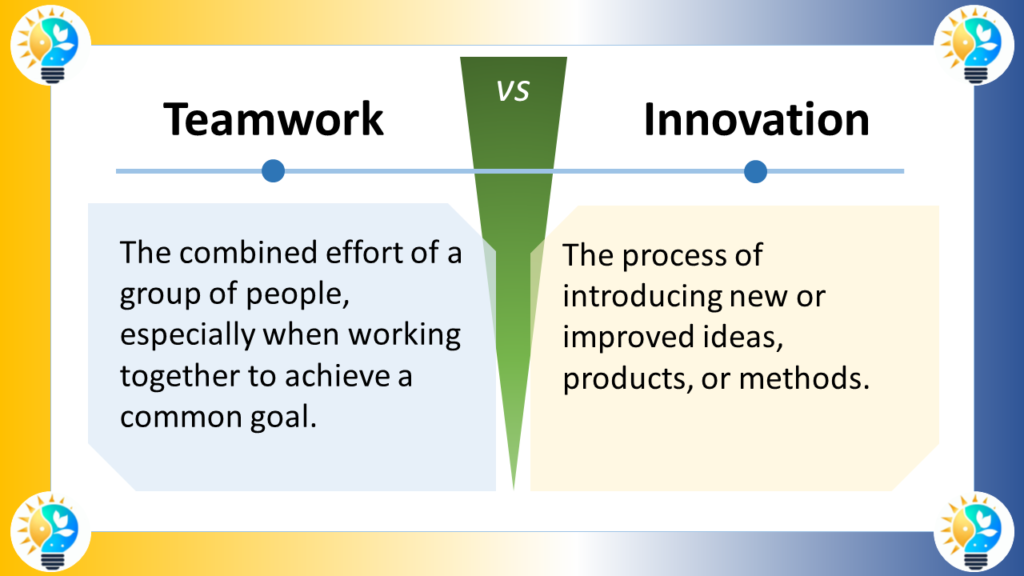To fully understand the concept of Innovation, let’s go back to its roots.


Innovation is considered as a driving force in progress.
It includes the introduction of novel ideas, methods, or products that bring positive change and advancement.
For more information about innovations, check our glossary
What is the etymology of Innovation?
Earliest
The word “innovation” comes from the Latin word “innovatio,” which is derived from the verb “innovare.”
“Innovare” combines “in,” meaning “into,” and “novare,” meaning “to make new” or “to renew.” Therefore, the etymology of “innovation” suggests the concept of introducing something new or renewing existing ideas, methods, or products.
More recently
It was also borrowed from Middle French innovation, from Old French innovacion, from Late Latin innovatio, innovationem, from Latin innovo, innovatus. Morphologically innovate + -ion.
What are the words etymologically related to Innovation?
Words that share the same root as “innovation” generally stem from the Latin word “innovatio” and its verb form “innovare,” which means “to make new” or “to renew.” Here are some words with the same root.
Let’s explore some words related to innovation and their etymologies:
- Innovation: As mentioned earlier, “innovation” comes from the Latin word “innovatio,” derived from “innovare,” meaning “to make new” or “to renew.”
- Innovate: This word is directly derived from the Latin “innovare,” reinforcing the idea of introducing something new.
- Novelty: The word “novelty” comes from the Latin “novellitas,” which means “newness” or “freshness.” It shares roots with the Latin “novus,” meaning “new.”
- Renovate: This word is derived from the Latin “renovare,” where “re-” denotes repetition or intensity, and “novare” means “to make new.” So, “renovate” implies the act of making something new again.
- Novice: “Novice” comes from the Latin “novicius,” meaning “new” or “beginner.” It originally referred to someone new to a particular activity or skill.
- Revolution: The word “revolution” has Latin roots, with “re-” signifying repetition or intensity, and “volvēre” meaning “to roll” or “to turn.” It implies a significant and fundamental change or turning point.
- Originate: “Originate” is derived from the Latin “originare,” which comes from “origin,” meaning the point from which something begins.
- Avant-garde: This term, borrowed from French, literally means “advance guard” and is used to describe individuals or ideas that are at the forefront of innovation or experimental ideas.
- Progress: “Progress” has Latin origins, with “pro-” meaning forward and “gradi” meaning to step or walk. It signifies moving forward or advancing.
- Pioneer: The term “pioneer” has Middle French and Old French origins, originally meaning a foot soldier or someone who prepares the way for others. It is now used to describe those who lead the way in new developments or innovations.
These words collectively reflect the dynamic nature of innovation and the various facets of introducing, renewing, and advancing ideas and practices.
What Are Synonyms for Innovation?
Before we dive into the variations in meaning, let’s start by defining what we mean by “synonyms for innovation.” Synonyms are words or phrases that share similar meanings with a particular word. In the context of innovation, synonyms refer to words or expressions that convey the idea of creating something new, novel, or groundbreaking.
Synonyms of Innovation
- Invention: Often used interchangeably with innovation, “invention” emphasizes the act of creating something entirely new, typically a product or technology.
- Creativity: While closely related to innovation, “creativity” highlights the imaginative and artistic aspects of generating new ideas or solutions.
- Progress: “Progress” suggests forward movement and improvement, which may or may not involve entirely new creations but often involves enhancing existing processes or products.
- Advancement: Similar to progress, “advancement” focuses on moving forward, particularly in terms of knowledge, technology, or society.
- Transformation: “Transformation” emphasizes the profound change that innovation can bring about, altering the way things are done or understood.
- Revolution: When something is described as a “revolution,” it implies a significant and disruptive change, often associated with technological breakthroughs.
- Modernization: This synonym underscores the process of updating or adapting to contemporary standards or technologies.
The Significance of Synonym Choice
The choice of synonym can subtly alter the perception of innovation. For example, describing a company as “innovative” may imply a broad range of creative ideas, while labeling it as “progressive” might suggest incremental improvements.
What are the best synonyms for innovation and innovate?
Context Matters
Understanding the nuances of innovation synonyms is crucial in various contexts. For instance, in marketing, using terms like “cutting-edge” or “revolutionary” can grab attention, while in scientific research, “groundbreaking” and “pioneering” may be more appropriate.
What are the best Synonyms of Innovation For Business or Technology?
FAQ
Q: How has the meaning of innovation changed over time?
A: While the core meaning of introducing something new has remained, the term has evolved to emphasize practical implementation and value creation, especially in business contexts.
Q: Are all new things considered innovations?
A: Not necessarily. In modern usage, innovation typically implies not just novelty, but also practical application and value creation.
Q: How does the etymology of innovation relate to its current usage?
A: The root meaning of “introducing something new” still forms the core of the concept, but it has expanded to include the processes of implementation and value creation.
Q: Can understanding the etymology of innovation help in fostering innovation?
A: Yes, understanding the root meaning can remind us that innovation is fundamentally about introducing change and newness, which can inspire more creative and open-minded approaches to problem-solving.
TO NOTE:
- Synonyms for innovation encompass a spectrum of meanings, from creating something entirely new to advancing existing concepts.
- Context plays a vital role in choosing the right synonym to convey the desired message.
- Synonym choice can impact how innovation is perceived in different industries and fields.


